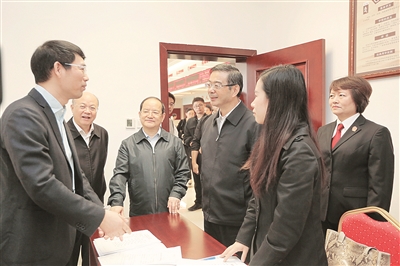SPC head inspects Jiangxi, calls for building 'safe China'
The head of China's top tribunal called for better implementing judicial functions and building a safe China at a higher level during an inspection visit to Jiangxi province.
 |
|
Zhou Qiang (third from right), chief justice and president of the Supreme People's Court (SPC) of China, inspects the Jiangxi Higher People's Court.[Photo by Cao Yongbin/People's Court Daily] |
At the Nanchang Intermediate People's Court, Zhou inspected the litigation service center, law-enforcement command center and trial courts, and exchanged ideas with judges and enforcement officers.
Zhou said that the scope of law-enforcement should be expanded, and addressed difficulties inthat area that otherwise may arise in two or three years' time.
At the Ruijin People's Court, Zhou encouraged judicial personnel to keep in mind the glorious revolutionary traditions of the city and play a leading role for other courts across the country in establishing justice and serving the people heart and soul.
The president also spoke highly of the information construction of courts in Jiangxi province, adding that application of artificial intelligence in "smart courts" can improve judicial services.
When visiting Wuyuan county, Zhou demanded that the local natural environment should be well preserved. He said that disputes between booming tourism and environmental interests must be properly resolved.
Observing implementation of case filing reformwas on Zhou's agenda.
At the litigation service center of the Jingdezhen Intermediate people's Court, Zhang Jing, who was a judge for 23 years, said,"The filing system greatly benefits the judge and the party concerned...and people can communicate with judges and go through the procedures online, which is highly efficient."
At the Zhushan District People's Court, a special workshop -- the Yu Mei legal studio -- was opened to serve as a model for the supervision of the court's work, andto safeguard the rights and interests of the people.
At the Lianxi District People's Court, Zhou learned that through reform of judicial responsibility, the number of judges has decreased but the rate of files closed has risen by 30 percent.
Zhou said the reform highlighted the dominant role of judges, and enhanced the enthusiasm and sense of responsibility of newly appointed judges.
Provincial Party secretary Lu Xin and other leaders joined Zhou in the inspection in Jiangxi, known as the cradle of the Chinese revolution in modern historical terms.









